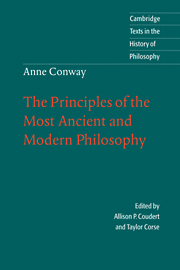Book contents
- Frontmatter
- Contents
- Acknowledgments
- Introduction
- Chronology
- Further reading
- Note on the text
- The Principles of the Most Ancient and Modern Philosophy
- Unpublished Preface by Henry More
- Published Preface
- Chapter I
- Chapter II
- Chapter III
- Chapter IV
- Chapter V
- Chapter VI
- Chapter VII
- Chapter VIII
- Chapter IX
- Index
- Cambridge Texts in the History of Philosophy
Chapter I
Published online by Cambridge University Press: 18 November 2009
- Frontmatter
- Contents
- Acknowledgments
- Introduction
- Chronology
- Further reading
- Note on the text
- The Principles of the Most Ancient and Modern Philosophy
- Unpublished Preface by Henry More
- Published Preface
- Chapter I
- Chapter II
- Chapter III
- Chapter IV
- Chapter V
- Chapter VI
- Chapter VII
- Chapter VIII
- Chapter IX
- Index
- Cambridge Texts in the History of Philosophy
Summary
Sections 1, 2, 3, 4, 5 concern God and his divine attributes. Sections 6 & 7 show how the Trinity could be conceived in God according to Scripture so that Jews, Turks, or other peoples would not be offended, if these words, “three distinct persons,” which are not in Scripture and have no reasonable sense, are omitted.
S. 1. God is spirit, light, and life, infinitely wise, good, just, strong, all-knowing, all-present, all-powerful, the creator and maker of all things visible and invisible.
S. 2. In God there is no time, change, arrangement, or division of parts. For he is wholly and universally one in himself and within himself without any variation or admixture. In himself he has no darkness or corporeality at all, nor any form, image, or figure whatsoever.
S. 3. He is also in a true and real sense an essence or substance distinct from his creatures, although not divided or separate from them but present in everything most closely and intimately in the highest degree. Nevertheless, they are not parts of him or changeable into him, just as he is not changeable into them. He himself is also in a true and real sense the creator of all things, who not only gives to them form and figure but also essence, life, body, and whatever good they have.
S. 4. And since there is no time in him nor any mutability, there can exist in him no new knowledge or will at all, but his will and knowledge are eternal and without time or beyond time.
- Type
- Chapter
- Information
- Publisher: Cambridge University PressPrint publication year: 1996

